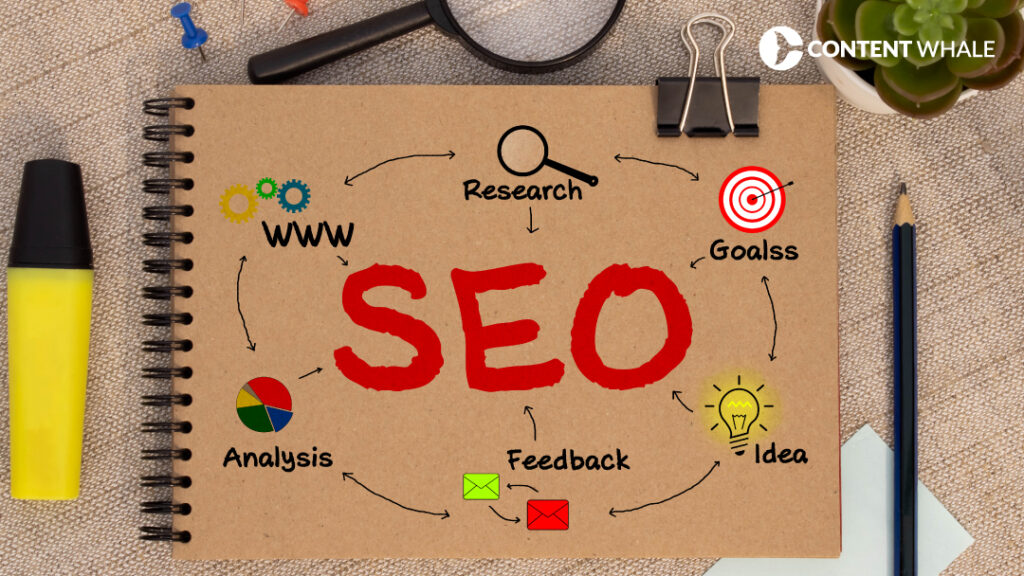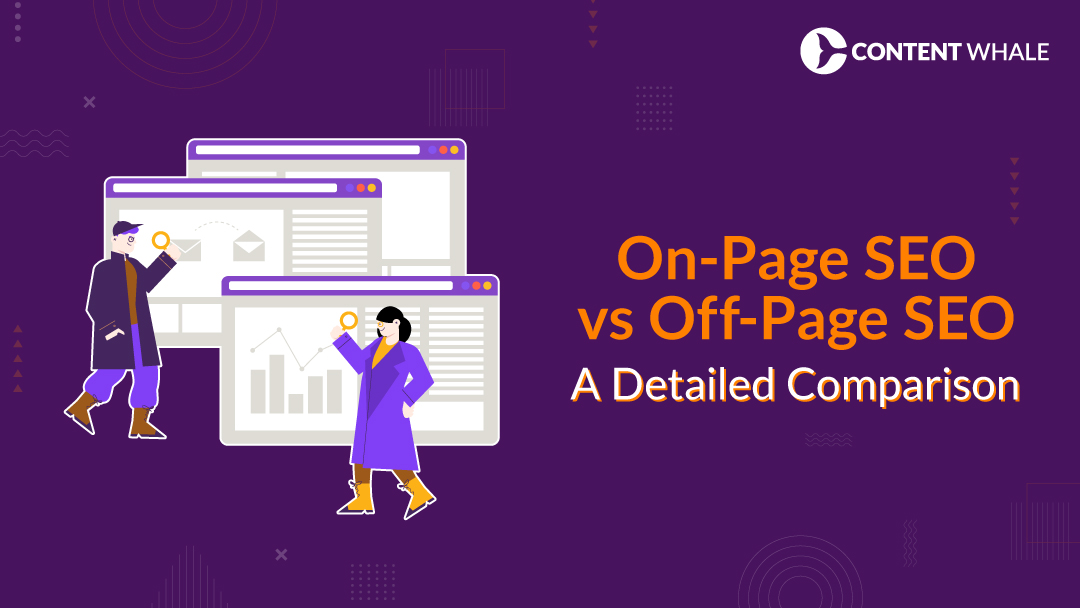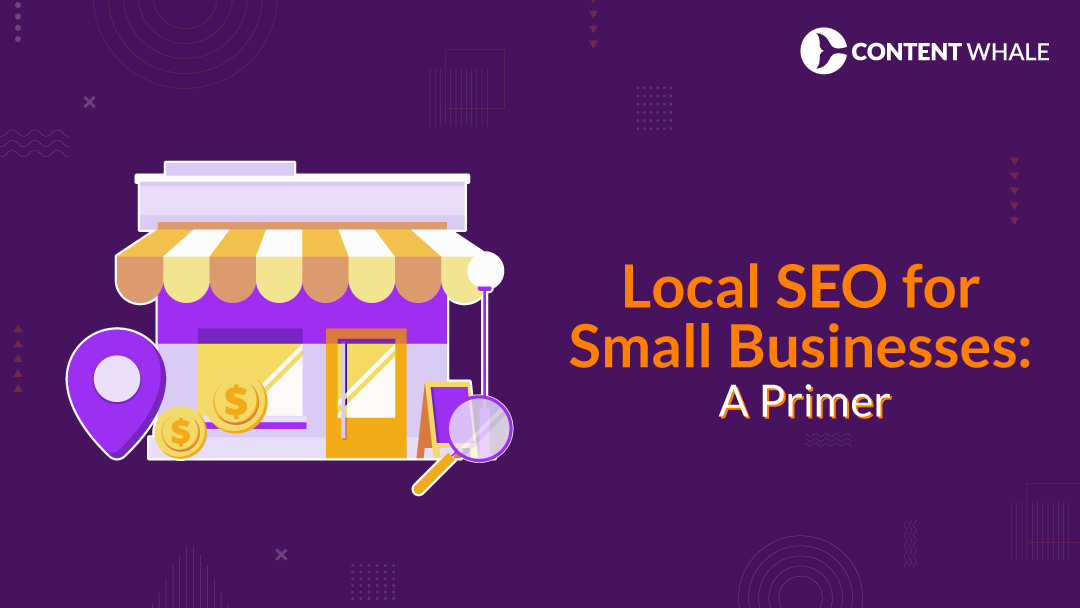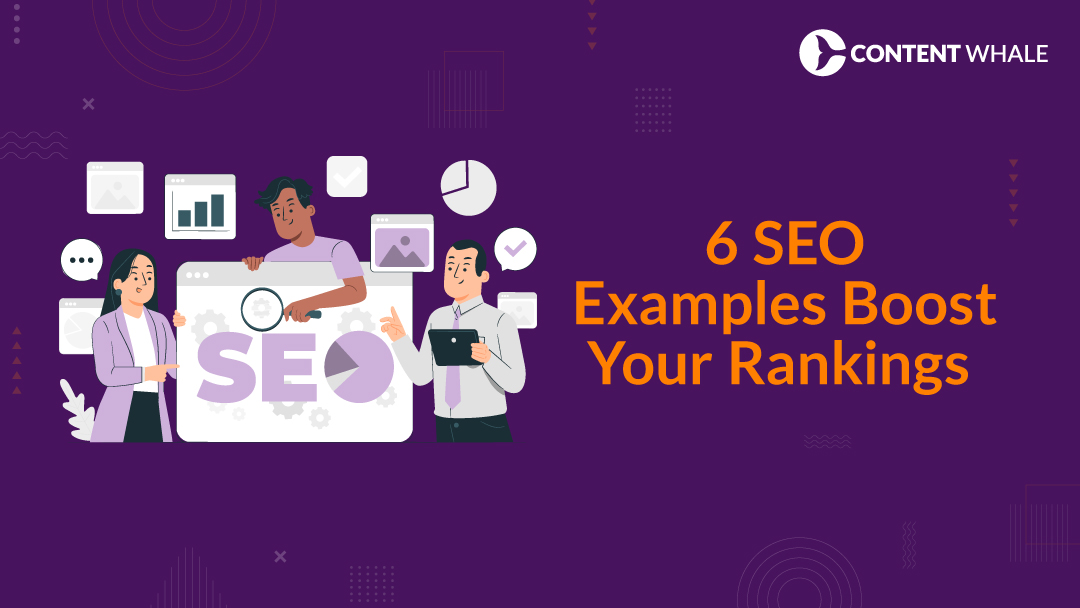Quick Summary
Understanding the differences between on-page SEO vs. off-page SEO is crucial for a comprehensive SEO strategy. On-page SEO focuses on optimizing elements within your website, such as meta tags, content optimization, and internal linking, to improve search engine rankings and user experience. Off-page SEO, on the other hand, involves activities outside your website, like link building and gaining backlinks, which enhance your site’s domain authority and credibility. Both techniques are essential and complement each other, ensuring optimal visibility and performance in search engine results.
SEO plays a vital role in digital marketing, significantly boosting online visibility and driving organic traffic. Understanding various SEO techniques is essential for anyone looking to improve their website’s search engine rankings. Two primary categories stand out among these techniques: on-page SEO and off-page SEO. Both are crucial for a well-rounded SEO strategy, but they focus on different aspects of optimization.
On-page SEO (or on-site SEO) involves optimizing elements within your website, such as content optimization, meta tags, and internal linking. These elements are within the website owner’s control and can directly impact how search engines perceive the relevance and quality of a webpage. Ensuring your website is mobile-friendly, loads quickly, and is easy to navigate are also key components of technical SEO.
Statistically, 68% of online experiences begin with a search engine, and 53.3% of all website traffic comes from organic searches. This underscores the importance of on-page SEO in improving your website’s visibility and ranking. Furthermore, research shows that pages with optimized meta tags and well-structured content tend to rank higher on search engine results pages (SERPs).
On the other hand, off-page SEO refers to actions taken outside your website to improve its authority and credibility. This includes link building, backlink strategies, and social media signals. Effective off-page SEO can enhance your site’s domain authority and increase its chances of ranking higher in search engine results. High-quality backlinks are a significant ranking factor, with 55.1% of websites without any backlinks never reaching the top 10 Google search results.
This blog will provide a comprehensive SEO comparison between on-page SEO and off-page SEO, highlighting their unique roles and importance.
By understanding these differences, you can develop a balanced approach that leverages both SEO techniques for optimal results.
Understanding On-Page SEO

On-page SEO refers to the practice of optimizing individual web pages to rank higher and earn more relevant traffic in search engines. This involves a range of SEO techniques that are entirely within the control of the website owner. Let’s explore some key elements of on-page SEO:
1. Meta Tags
Meta tags are snippets of text that describe a page’s content. They don’t appear on the page itself but only in the page’s source code. The title tag and the meta description are critical elements:
- Title Tag: This is the main heading that appears in search engine results. It should be concise, include the primary keyword, and be compelling to attract clicks.
- Meta Description: This brief summary of the page’s content appears below the title tag in search engine results. While not a ranking factor, a well-crafted meta description can significantly improve the click-through rate.
2. Content Optimization
Creating high-quality, relevant content is a cornerstone of on-page SEO. This involves:
- Keyword Research: Identifying and incorporating relevant keywords naturally into your content. Keywords should be included in headings, the first paragraph, and sprinkled throughout the text.
- Content Quality: Ensuring the content is valuable, informative, and engaging for the audience. This can include using various formats such as text, images, and videos to enhance user experience.
3. Internal Linking
Internal linking involves linking to other pages within your website. This practice helps to:
- Improve page load speed by distributing link equity throughout your site.
- Enhance user navigation, keeping visitors on your site longer.
- Help search engines understand the structure and context of your site, improving indexing and ranking.
4. Page Load Speed
The speed at which your website loads is a crucial factor in both user experience and technical SEO. Pages that load faster tend to have:
- Lower bounce rates.
- Higher engagement rates.
- Better rankings in search engine results. Tools like Google PageSpeed Insights can help identify and fix issues that slow down your site.
5. Mobile-Friendliness
A significant portion of web traffic comes from mobile devices, so having a mobile-friendly website is essential.
Responsive design ensures that your website adapts to different screen sizes, providing a seamless user experience across all devices.
Google’s mobile-first indexing means that the mobile version of your website is considered the primary version for ranking purposes.
6. Examples of Effective On-Page SEO Practices
- Optimized Meta Tags: Crafting clear, concise, and keyword-rich title tags and meta descriptions.
- Structured Content: Using headings (H1, H2, H3, etc.) to break down content into digestible sections, making it easier for users and search engines to understand.
- Efficient Internal Linking: Linking related content within your site to guide users to additional information, keeping them engaged and reducing bounce rates.
- Enhanced User Experience: Ensuring quick load times and a mobile-friendly design to keep users satisfied and engaged.
Focusing on these on-site SEO elements can create a solid foundation that enhances user experience and search engine rankings.
On-page SEO is all about making your website more appealing and understandable to users and search engines, ultimately driving more organic traffic to it.
Exploring Off-Page SEO

Off-page SEO involves all the activities that you and others do away from your website to raise the ranking of a page with search engines. This form of SEO focuses on building your site’s reputation and authority through external factors. Let’s delve into the essential components of off-page SEO:
1. Backlinks and Link Building
Backlinks are links from other websites that point to your site. These are a major ranking factor because they represent a “vote of confidence” from one site to another. The process of acquiring these links is known as link building. Here’s why they matter:
- Quality Over Quantity: Search engines prioritize the quality of backlinks over quantity. Links from high-authority sites (those with high domain authority) are more valuable.
- Natural Links: Backlinks should come naturally through high-quality content that others want to reference. Purchasing links or using link farms can lead to penalties.
- Anchor Text: The text used in a backlink (anchor text) also impacts SEO. Descriptive, keyword-rich anchor text is most effective.
2. Social Media Signals
Social media can indirectly impact your SEO. While search engines don’t directly consider social signals as a ranking factor, there are several ways social media can boost your off-page SEO:
- Content Distribution: Sharing your content on social platforms can increase visibility, leading to more backlinks.
- Engagement: High levels of engagement (likes, shares, comments) can drive traffic to your site and improve its authority.
- Brand Awareness: Consistent social media presence helps in building brand awareness, which can lead to more branded searches and mentions.
3. Brand Mentions
Mention of your brand across the web, even without a direct backlink, can positively and affect your SEO. Search engines recognize brand mentions as a form of credibility. Tools like Google Alerts can help track when and where your brand is mentioned.
4. Influencer Outreach
Collaborating with influencers can amplify your SEO efforts. Influencers can:
- Share Your Content: Influencers sharing your content can result in high-quality backlinks and increased traffic.
- Review and Mention: Their reviews and mentions can build trust and authority, encouraging more organic links from other sources.
5. Impact on Domain Authority and Search Rankings
Off-page SEO significantly influences your site’s domain authority, which is a measure of its trustworthiness and relevance. Higher domain authority often correlates with better search rankings. Here’s how off-page SEO contributes:
- Credibility: High-quality backlinks from reputable sites signal to search engines that your site is credible.
- Visibility: More backlinks and social mentions increase your site’s visibility, driving more traffic and engagement.
- Long-Term Results: While off-page SEO efforts can take time to show results, they tend to have a lasting impact on your search engine rankings.
6. Examples of Effective Off-Page SEO Strategies
- Guest Blogging: Writing articles for other reputable sites can help you earn high-quality backlinks.
- Content Marketing: Creating shareable content, such as infographics or comprehensive guides, can naturally attract backlinks.
- Community Engagement: Participating in forums, Q&A sites, and communities related to your industry can help build relationships and earn backlinks.
- Broken Link Building: Identifying broken links on other websites and suggesting your content as a replacement can be an effective way to gain backlinks.
By focusing on these off-page SEO techniques, you can improve your site’s authority and credibility, leading to higher search engine rankings. Balancing on-page SEO vs. off-page SEO efforts is key to a successful overall SEO strategy.
On-Page SEO vs Off-Page SEO: Key Differences

When comparing on-page SEO vs. off-page SEO, it’s essential to understand their distinct roles and impacts on your overall SEO strategy. Both are integral parts of a successful SEO campaign, but they focus on different aspects of website optimization.
1. Focus and Scope
On-page SEO revolves around optimizing individual web pages to improve search engine rankings and drive organic traffic. This includes content optimization, proper use of meta tags, effective internal linking, and ensuring fast page load speed. On-site SEO also involves making your website mobile-friendly and improving technical SEO aspects, such as site architecture and usability.
Off-page SEO, on the other hand, focuses on actions taken outside your website to impact your rankings within search engine results pages (SERPs). This primarily involves link building, gaining backlinks from reputable sites, leveraging social media signals, and engaging in influencer outreach. The goal of off-page SEO is to enhance your site’s domain authority and credibility.
2. Control and Implementation
One of the significant differences between on-page SEO vs. off-page SEO is the level of control you have over each. With on-page SEO, you have direct control over the elements that can be optimized. This includes tweaking your content, improving meta tags, and refining your internal linking structure. The changes you implement can lead to immediate improvements in site performance and user experience.
Conversely, off-page SEO requires building relationships and earning links from external sources, which you have less control over. These activities, like acquiring high-quality backlinks and mentions on social media, often involve longer-term strategies and ongoing efforts.
3. Strategy and Impact
On-page SEO strategies are primarily about making your website more appealing and understandable to both search engines and users. This involves:
- Content Optimization: Creating high-quality, relevant content that includes well-researched keywords.
- Technical SEO: Ensuring your site’s technical elements, like page load speed and mobile-friendliness, are optimized.
- Internal Linking: Using links within your website to connect related content and improve navigation.
Off-page SEO strategies aim to build your website’s authority and reputation through external validation. Key strategies include:
- Link Building: Acquiring high-quality backlinks from reputable websites.
- Social Media Engagement: Using social platforms to promote your content and attract organic links.
- Brand Mentions: Encouraging mentions of your brand across the web to build credibility and trust.
4. Immediate vs. Long-Term Efforts
Changes made through on-page SEO can often yield quicker results. For example, improving your site’s page load speed or optimizing meta tags can lead to immediate enhancements in user experience and search engine rankings.
Off-page SEO efforts typically take longer to show results. Building a robust backlink profile or gaining social media traction involves sustained effort over time. However, the benefits of off-page SEO are long-lasting and can significantly enhance your site’s domain authority and overall visibility.
5. Importance of a Balanced Approach
For optimal results, a balanced approach combining both on-page SEO and off-page SEO is crucial. Each type of SEO complements the other, creating a holistic strategy that covers all bases. Here’s how they work together:
- On-page SEO ensures your website is user-friendly, informative, and technically sound.
- Off-page SEO enhances your site’s authority and trustworthiness, driving more organic traffic and improving rankings.
For instance, while on-page SEO might make your content easily discoverable and engaging, off-page SEO can amplify its reach and credibility through external endorsements like backlinks and social media shares.
6. Real-World Examples and Case Studies
Let’s examine some real-world examples and case studies that demonstrate successful implementations to illustrate the effectiveness of integrating on-page SEO and off-page SEO strategies.
I) Zapier
Zapier has significantly boosted its organic traffic by focusing on creating high-quality, valuable content for its blog. This on-page SEO strategy was complemented by an effective link-building campaign, which resulted in over 1.6 million monthly search visits.
By combining robust content optimization with strategic off-page SEO efforts, Zapier has managed to secure a strong online presence and high domain authority.
II) UAV Coach
UAV Coach, a business specializing in commercial drones, implemented a six-step SEO process to generate recurring traffic and leads. This strategy included thorough keyword research, high-quality content creation, and maximizing on-page optimization. They also developed a lead magnet to increase email subscribers and focused on link-building strategies.
As a result, UAV Coach saw an 11,065% increase in overall organic traffic and secured the #1 spot on Google for their targeted keywords.
III) Tharawat Magazine
Tharawat Magazine aimed to improve its SEO by incorporating a structured editorial workflow. The magazine had over a thousand articles but needed to optimize and organize this content better. By conducting a comprehensive content clean-up and implementing targeted keyword strategies, Tharawat Magazine increased its organic traffic by 321% within five months.
This approach shows how effective content optimization and SEO audits can be when combined with on-page SEO tactics.
These case studies underscore the importance of a balanced approach that leverages both on-page SEO and off-page SEO.
By optimizing on-page elements and engaging in effective off-page strategies, websites can significantly enhance their search engine rankings and drive more organic traffic.
Looking for SEO tools to enhance your digital marketing strategy? We’ve compiled a comprehensive list of the best SEO tools for 2024 that cover everything from keyword research and technical analysis to local SEO tracking and comprehensive audits. Click here to check out our blog for detailed insights and recommendations on the top tools to help you boost your website’s search engine rankings and overall performance.
Conclusion

Summarizing the discussion on on-page SEO vs. off-page SEO, both strategies play vital roles in enhancing a website’s visibility and search engine rankings.
On-page SEO involves optimizing elements within your website, such as content optimization, meta tags, internal linking, and ensuring a fast page load speed. These SEO techniques help improve user experience and make your website more appealing to search engines. The immediate impact of on-page optimizations can be seen in better site performance and usability.
On the other hand, off-page SEO focuses on building your website’s reputation and authority through external factors like link building, gaining high-quality backlinks, and leveraging social media signals. These efforts enhance your site’s domain authority and contribute to long-term improvements in search engine rankings.
To achieve the best results, a balanced approach is essential. Combining on-page SEO and off-page SEO creates a comprehensive SEO strategy that covers all bases, ensuring both your site’s internal structure and external reputation are optimized.
Encouraging readers to implement both on-site SEO and off-page SEO techniques will help them develop a robust SEO plan. By understanding the unique contributions of each approach, you can leverage their strengths to drive organic traffic and achieve sustainable growth in search engine rankings.
FAQs
What is the primary difference between on-page SEO and off-page SEO?
On-page SEO refers to optimizing elements within your website, such as content optimization, meta tags, and internal linking. These factors are under your control and directly impact your site’s technical SEO and user experience.
Off-page SEO, however, involves activities outside your website that aim to improve its authority and credibility, such as link building, gaining high-quality backlinks, and leveraging social media signals.
How does on-page SEO impact search engine rankings?
On-page SEO impacts search engine rankings by making your site more accessible and understandable to search engines. Key practices include optimizing meta tags, improving page load speed, ensuring mobile-friendliness, and creating high-quality, relevant content through thorough keyword research.
These elements help search engines index your content more effectively and rank it higher in search results.
What are some effective off-page SEO techniques?
Effective off-page SEO techniques include link building to acquire high-quality backlinks, engaging with users on social media platforms to boost visibility and traffic, and participating in influencer outreach to gain mentions and links from authoritative sources.
These strategies enhance your site’s domain authority and improve its credibility in the eyes of search engines.
Can I achieve good SEO results by focusing on only one type of SEO?
While focusing on one type of SEO can yield some results, achieving optimal outcomes requires a balanced approach that integrates both on-page SEO and off-page SEO.
On-site SEO improves your website’s structure and content, making it user-friendly and easily indexable by search engines. Off-page SEO builds your site’s reputation and authority, driving more organic traffic and enhancing overall search rankings.
How long does it take to see results from on-page vs. off-page SEO?
Since on-page SEO changes are within your direct control, they can lead to relatively quick improvements in search rankings and user experience. Optimizing meta tags and improving page load speed can show immediate benefits.
Off-page SEO, such as building backlinks and enhancing domain authority, typically takes longer to produce noticeable results. This process involves ongoing efforts and can take several months to a year to significantly impact your search rankings.





